Ancient-Chinese-Philosophy中国古代哲学
Ancient Chinese Philosophy汇总
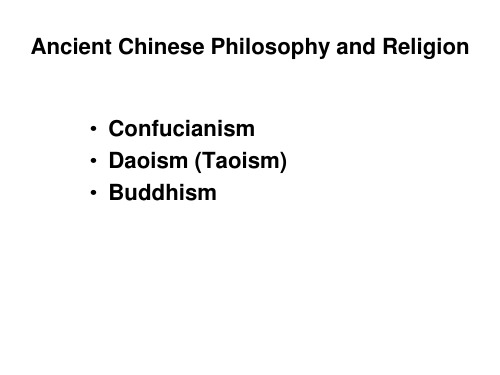
• The “Five Classics”: – Classic of Changes – Classic of History – Classic of Poetry – Classic of Rites – Spring and Autumn Annals
Confucianism
Other important concepts of Confucius’ Philosophy
Xiao (Filial piety)
➢ the respect and obedience to one’s parents. ➢ the specific duties and veneration to all the
The Three Obediences and Four Virtues
• The traditional ideal of a woman is that she is a dependant being whose behavior is governed by “three obediences” (to father before marriage, to husband after marriage, and to son after becoming a widow: 未嫁从父, 既嫁 从夫, 夫死从子) and four “virtues” (morality, proper speech, modest manner, and diligence: 品德、言语、仪 态、女工).
great famous scholars. Purpose of his teaching: to help his students acquire
中国传统文化第三讲(中国古代哲学)
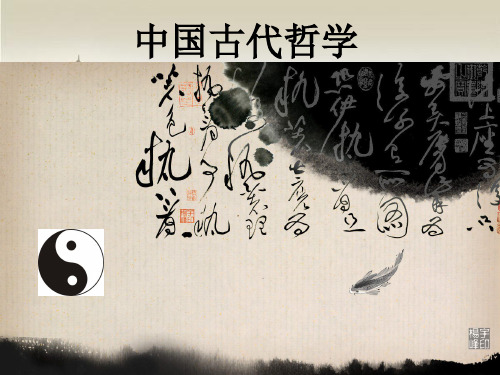
• 以上五行相生相克的关系可用下图表示: 相生:水——木——火——土——金 相克:金——木——土——水——火
• (2)《周易》以八卦说明自然现象和社会 的关系。
②把握“理”的方法: 前者主张“格物致知”; 后者主张内心反省,致良知。
理学强调通过道德 自觉达到理想人格 的建树,也强化了 中华民族注重气节 和德操、注重社会 责任与历史使命的 文化性格。 如古代一些名将名 相。
宋明理学在元明清 七百年里都是官方 的哲学,对中国乃 至东南亚产生深远 的影响。
哲学与人生境界
各种于此 种现各图 现象种说 象。预明 。两测易
相。经 结能中 合用的 可于八 能解卦 解释能 释各用
• (3)阴阳:中国古代哲学用以表示事物的 两个对立面的哲学范畴,殷商和周代已有 了原始的阴阳概念,最初的概念是指日光 的向背,向日为阳,背日为阴。古代的思 想家看到一切都有正反两个方面
• 《易传》中说:“一阴一阳之谓道”。
“吾心即是宇宙”
陆九渊(1139—1193)是南
宋理学主观唯心主义思想体系
的代表、心学开创者。他提出
了“心即理”、“宇宙便是吾心,
吾心即是宇宙”的思想。他认为
“理”就像太阳、月亮一样明显,
不用学习也能体会。因此提出
陆九渊
“发明本心”以求理的方法。求
“理”就是进行内心的反省。这与朱熹格物致知的
的方法发生分歧,1176年,双方在江西信州鹅湖
道家追求是精神的超脱解放,如果执着于外在的物 欲、功名利禄,束缚于名教名言,那就会被物所主 宰,故而庄子要化解物形,求精神之逍遥自由。
中国古代哲学概论
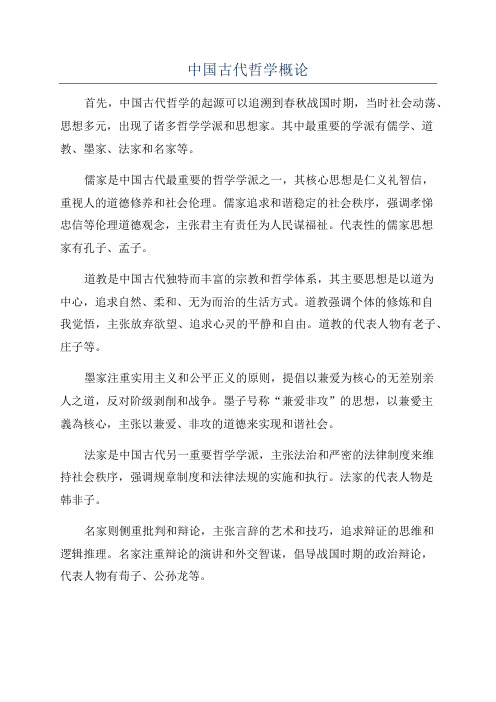
中国古代哲学概论首先,中国古代哲学的起源可以追溯到春秋战国时期,当时社会动荡、思想多元,出现了诸多哲学学派和思想家。
其中最重要的学派有儒学、道教、墨家、法家和名家等。
儒家是中国古代最重要的哲学学派之一,其核心思想是仁义礼智信,重视人的道德修养和社会伦理。
儒家追求和谐稳定的社会秩序,强调孝悌忠信等伦理道德观念,主张君主有责任为人民谋福祉。
代表性的儒家思想家有孔子、孟子。
道教是中国古代独特而丰富的宗教和哲学体系,其主要思想是以道为中心,追求自然、柔和、无为而治的生活方式。
道教强调个体的修炼和自我觉悟,主张放弃欲望、追求心灵的平静和自由。
道教的代表人物有老子、庄子等。
墨家注重实用主义和公平正义的原则,提倡以兼爱为核心的无差别亲人之道,反对阶级剥削和战争。
墨子号称“兼爱非攻”的思想,以兼愛主義為核心,主张以兼爱、非攻的道德来实现和谐社会。
法家是中国古代另一重要哲学学派,主张法治和严密的法律制度来维持社会秩序,强调规章制度和法律法规的实施和执行。
法家的代表人物是韩非子。
名家则侧重批判和辩论,主张言辞的艺术和技巧,追求辩证的思维和逻辑推理。
名家注重辩论的演讲和外交智谋,倡导战国时期的政治辩论,代表人物有荀子、公孙龙等。
以上学派和思想在中国古代哲学的历史中曾经交相辉映,相互影响,形成了中国古代哲学的丰富传统。
在这些学派和思想的交流碰撞中,形成了中国独特的思想体系和文化传统。
总结起来,中国古代哲学具有重视伦理道德、强调和谐共存、尊重自然、追求自由平静等特点。
这些思想和理念在中国古代的政治、社会、文化等方面都产生了深远的影响,也对世界哲学作出了重要贡献。
我国传统文化3.AncientChinesePhilosophyand__Religion哲学和宗教
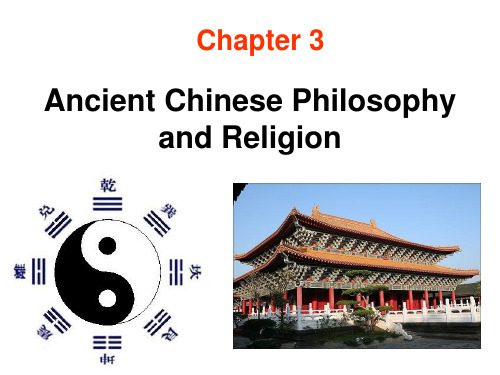
• Wu wei (simplified Chinese: 无为; pinyin: wúwéi) is a central concept in Taoism. The literal meaning of wu wei is "without action". It is often expressed by the paradox wei wu wei, meaning "action without action" or "effortless doing". The practice and efficacy of wu wei are fundamental in Taoist thought, most prominently emphasized in Taoism. The goal of wu wei is alignment with Tao, revealing the soft and invisible power within all things. It is believed by Taoists that masters of wu wei can observe and follow this invisible potential, the innate in-action of the Way.
• The Taiji (Great Heavenly Axis) forms a unity, from which two antagonistic (相 反的)concepts, Yin and Yang originate.
• Yin and Yang. The word Yin originally referred to a hillside facing away from the sun. Philosophically, it stands the gloomy, passive, female concept, whereas Yang (the hillside facing the sun) stands for the bright, active, male concept.
介绍中国古代哲学英语作文200词

介绍中国古代哲学英语作文200词全文共10篇示例,供读者参考篇1Hello everyone! Today, I want to introduce you to ancient Chinese philosophy.Ancient Chinese philosophy is a big deal in China because it's all about thinking and stuff. It's like, really old and smart people thought of all these cool ideas that help us understand the world and like, how to live a good life.There are a bunch of famous ancient Chinese philosophers, like Confucius, Laozi, and Mozi. Confucius was all about being a good person and following rules and stuff. Laozi was more like, chill out and go with the flow, man. And Mozi was all about being nice to everyone and helping people out.One of the most important ideas in Chinese philosophy is yin and yang. It's like, everything has an opposite and they balance each other out. Like, you can't have light without darkness, or hot without cold. It's all about finding balance in the world.Another cool idea is the five elements, like wood, fire, earth, metal, and water. They're super important in Chinese philosophy because they help explain how everything in the world is connected and like, how things change and grow.So yeah, ancient Chinese philosophy is really fascinating and has a lot of great ideas that can help us understand the world and live our best lives. Thanks for listening!篇2Hey guys, do you know about ancient Chinese philosophy? Let me introduce it to you in a fun and easy way!Ancient Chinese philosophy is a big part of Chinese culture and history. It includes many different schools of thought like Confucianism, Taoism, and Legalism. These philosophies were developed by wise people in ancient China who tried to figure out how to live a good life and create a harmonious society.Confucianism, founded by Confucius, is all about respecting your elders, being kind to others, and following traditions. Confucius believed that if everyone behaved morally and treated each other with respect, society would be peaceful and prosperous.Taoism, founded by Laozi, focuses on living in harmony with the Tao, or the natural way of the universe. Taoists believe in simplicity, humility, and living in the moment. They think that by letting go of desires and expectations, people can find true happiness and inner peace.Legalism, on the other hand, emphasizes strict laws and harsh punishments to maintain order in society. Legalists believe that people are naturally selfish and need strong rulers to keep them in line.These three philosophies have had a big impact on Chinese culture and still influence people's beliefs and values today. So next time you hear about ancient Chinese philosophy, you'll know a little bit more about what it's all about!篇3Title: Introduction to Ancient Chinese PhilosophyHey guys! Today, I'm going to talk to you about something super cool - Ancient Chinese Philosophy! It's like, way back in the day, people in China were thinking super deep thoughts about life and stuff. Let me tell you all about it.One of the most famous ancient Chinese philosophers is Confucius. He was all about teaching people how to be good and moral. He said things like, "Do not do to others what you do not want done to yourself." Basically, he wanted everyone to treat each other with respect and kindness.Another famous philosopher is Laozi, who came up with Daoism. He believed in living in harmony with nature and finding balance in life. He said things like, "Nature does not hurry, yet everything is accomplished." It's all about going with the flow and finding peace within yourself.Then there's Mozi, who believed in universal love and helping others. He said, "If people desired earnestly to practice benevolence and righteousness, all would be well with them." It's all about being kind and caring for others.And finally, we have Sun Tzu, who wrote "The Art of War." He was all about strategies and tactics, and he said things like, "The supreme art of war is to subdue the enemy without fighting." It's all about being smart and clever in how you handle things.So, there you have it - Ancient Chinese Philosophy in a nutshell! It's all about being good, finding balance, showing love, and being strategic. Pretty cool, right? Keep on thinking deep thoughts, little philosophers!篇4Hey guys, do you know about ancient Chinese philosophy? Today, I'm going to introduce you to some of the most famous ancient Chinese philosophers and their ideas.First, let's talk about Confucius. Confucius was a great thinker and educator who lived in China over 2,500 years ago. He believed in the importance of traditional values like respect for elders and family loyalty. Confucius also stressed the importance of education and self-improvement.Next, we have Laozi, the founder of Taoism. Laozi believed in living in harmony with nature and finding inner peace. He wrote the Tao Te Ching, a book of wisdom that teaches us to live a simple and humble life.Another famous ancient Chinese philosopher is Mozi. Mozi was a philosopher who believed in universal love and equality. He promoted the idea of treating others with kindness and fairness, regardless of their social status.Lastly, we have Sun Tzu, the author of The Art of War. Sun Tzu was a military strategist who wrote the famous book on warfare and strategy. He believed in the importance of careful planning and strategy in battle.Overall, ancient Chinese philosophy is rich in wisdom and has had a profound influence on Chinese culture and society. These philosophers have left us with valuable teachings that are still relevant today. So, let's take a moment to learn from their ideas and apply them to our own lives.篇5Hello everyone! Today I want to introduce you to ancient Chinese philosophy. In ancient China, many great thinkers and philosophers had their own ideas about how people should live their lives and understand the world. Let's take a look at some of the most famous philosophies from ancient China.First, there was Confucianism, which was founded by Confucius. Confucius believed in the importance of family, respect for elders, and moral behavior. He taught that people should follow the principles of propriety, righteousness, and sincerity to create a harmonious society. Confucianism has had a huge impact on Chinese culture and society for thousands of years.Next, there was Taoism, which was founded by Laozi. Laozi believed in living a simple and natural life, in harmony with the Tao, or the way of the universe. He taught that by letting go ofdesires and living in the present moment, people could find peace and happiness. Taoism emphasizes the importance of balance and moderation in all things.Another important philosophy is Legalism, which was founded by Han Feizi. Legalism focused on strict laws and harsh punishments to maintain order and control in society. Legalist thinkers believed that people were inherently selfish and needed to be controlled by a strong central government. Legalism had a big influence on the governance of ancient China.Finally, there was Mohism, founded by Mozi. Mozi believed in universal love and impartiality, and taught that people should treat others with kindness and compassion. He also emphasized the importance of frugality and simplicity in daily life. Mohism promoted the idea of mutual benefit and cooperation to create a peaceful world.These are just a few of the many philosophies from ancient China. Each of these philosophies had a unique perspective on how people should live and interact with each other. Studying ancient Chinese philosophy can help us learn valuable lessons about ethics, morality, and the nature of the human experience. Let's continue to explore the wisdom of the past and apply it to our lives today. Thank you for listening!篇6Ancient Chinese philosophy is really cool and interesting! It's all about thinking deep and trying to figure out the meaning of life and the universe. There are so many famous philosophers in ancient China, like Confucius, Laozi, and Zhuangzi.Confucius was all about moral values and ethics. He believed in treating others with respect and kindness. One of his famous sayings is, "Do not do to others what you would not want done to yourself." This means we should treat others the way we want to be treated. Pretty simple, right?Laozi, on the other hand, was all about nature and harmony. He believed in living in harmony with the natural world and letting things happen as they are supposed to. One of his famous sayings is, "Nature does not hurry, yet everything is accomplished." This means we should go with the flow and not try to force things to happen.Zhuangzi was a bit more laid back and believed in living life to the fullest. He told stories to teach his philosophy, like the famous story of the butterfly dream. In this story, Zhuangzi dreamt he was a butterfly, and when he woke up, he wasn't sureif he was a man who dreamt he was a butterfly or a butterfly dreaming he was a man. Pretty mind-blowing, right?Overall, ancient Chinese philosophy is all about finding balance, living in harmony, and being a good person. It's a really cool way of thinking, and I think we can all learn a lot from these wise old philosophers.篇7Introduction to Ancient Chinese PhilosophyHey guys, today I want to talk about ancient Chinese philosophy. It's like, this super cool way of thinking that people from China way back in the day used to figure out how to live their lives and understand the world. It's totally mind-blowing!So, ancient Chinese philosophy is all about trying to understand the world and how everything works. One of the most famous dudes in ancient Chinese philosophy is Confucius. He was all about being kind and respectful to others, and he believed that if everyone did that, the world would be a better place. He also talked a lot about treating your family with love and respect.Then there's Laozi, who was all about living in harmony with nature. He thought that living a simple life and going with the flow of things was the key to happiness. He even wrote a book called the Tao Te Ching, which has tons of wise sayings about how to live a good life.Oh, and let's not forget about Mozi, who believed in the power of love and kindness. He thought that everyone should treat each other with compassion and help out those in need. Super important stuff, right?There are lots of other ancient Chinese philosophers too, each with their own ideas and beliefs. But the cool thing is that they all wanted to make the world a better place and help people live happy, fulfilling lives. How awesome is that?So yeah, that's a little introduction to ancient Chinese philosophy. It's all about being kind, respectful, and living in harmony with the world. Pretty rad, huh? Let's all try to be a little more like those ancient Chinese philosophers and make the world a better place!篇8Title: Introduction to Ancient Chinese PhilosophyHey guys, do you know about ancient Chinese philosophy? It's super cool and interesting! Ancient Chinese philosophy is all about thinking about life, the world, and how to be a good person. There are many famous philosophers in ancient China, like Confucius, Laozi, and Mozi.Confucius, also known as Kongzi, believed in the importance of family, respect for elders, and having good manners. He thought that everyone should follow the "Five Constant Virtues" which are benevolence, righteousness, propriety, wisdom, and faithfulness. Confucius wanted people to be kind, respectful, and honest with each other.Laozi, on the other hand, was all about nature and living in harmony with the universe. He founded Daoism, which teaches people to live a simple life, go with the flow, and find peace within themselves. Laozi believed that everything in the world is connected and that we should embrace the natural way of things.Mozi, another great philosopher, focused on universal love and the importance of treating everyone equally. He believed in promoting peace, helping others, and getting rid of selfishness. Mozi thought that everyone should care for each other and work together to create a better world.There are many more ancient Chinese philosophers with different ideas and beliefs, but they all share the common goal of seeking truth, wisdom, and happiness. Their teachings have influenced Chinese culture and society for thousands of years.So, next time you're thinking about life and how to be a better person, remember the wisdom of ancient Chinese philosophy. It's full of amazing insights and valuable lessons that can guide us in our own journeys. Cool, right?篇9Title: Introduction to Ancient Chinese PhilosophyHey guys! Today I'm going to talk about Ancient Chinese Philosophy. Ancient Chinese philosophy has a long history and has greatly influenced Chinese culture and way of thinking. There are three main schools of thought in ancient Chinese philosophy: Confucianism, Taoism, and Legalism.Confucianism, founded by Confucius, emphasizes the importance of social harmony and moral values. Confucius believed in the concept of filial piety, respect for elders, and the importance of rituals and ceremonies. He also emphasized the importance of education and self-improvement. Confucianismhas had a profound impact on Chinese society and is still influential today.Taoism, founded by Laozi, focuses on living in harmony with the Tao, or the way of nature. Taoists believe in simplicity, spontaneity, and naturalness. They emphasize the concept of Wu Wei, or non-action, and seek to achieve balance and harmony in life. Taoism has influenced Chinese art, literature, and medicine.Legalism, founded by Han Feizi, is based on the belief that humans are inherently selfish and greedy. Legalists believe in strict laws and harsh punishments to maintain social order and stability. They emphasize the importance of a strong central government and the use of rewards and punishments to control people's behavior.In conclusion, Ancient Chinese philosophy has played a crucial role in shaping Chinese culture and societal norms. Each school of thought offers its own unique perspective on life, morality, and governance. By studying these philosophies, we can gain a deeper understanding of Chinese history and tradition. So next time you hear about Confucius, Laozi, or Han Feizi, remember the impact they have had on Chinese philosophy!篇10Title: Introduction to Ancient Chinese PhilosophyHey guys! Today I'm going to talk to you about ancient Chinese philosophy. Have you ever heard of Confucius, Laozi, or Zhuangzi? They're some famous ancient Chinese philosophers who had a lot of cool ideas about life and stuff.First, let's talk about Confucius. He was all about being a good person and treating others with respect. Confucius believed in things like filial piety (being good to your parents) and loyalty to your friends and family. He also thought it was important to follow tradition and do your best in everything you do.Then there's Laozi, who was all about going with the flow and living in harmony with nature. He wrote the Tao Te Ching, which is a book all about how to live a balanced and peaceful life. Laozi believed that the Tao, or the way of nature, was the key to finding inner peace and happiness.Finally, we have Zhuangzi, who was all about questioning reality and seeing things from different perspectives. He wrote a bunch of funny and clever stories that make you think about the world in a whole new way. Zhuangzi believed that true freedom came from accepting the natural order of things and letting go of your own desires.So that's a quick intro to ancient Chinese philosophy! It's pretty cool to think about how these old dudes were talking about all the same stuff we think about today. Maybe we can learn something from them and live better lives too. Thanks for listening!。
《中国古代哲学史》课件

汉朝的道家思想
总结词
汉朝道家思想主张无为而治,强调自然法则和天人合一 ,认为应该顺应自然规律,追求内心的平静和与自然的 和谐。
详细描述
道家思想是中国古代哲学的一个重要流派,其代表人物 包括老子、庄子等。汉朝时期,道家思想在某些时期受 到统治者的重视,成为一种重要的政治哲学和社会思潮 。道家主张无为而治,即政府应该尽量减少对社会的干 预,让人民自由发展。同时,道家也强调人与自然的和 谐相处,认为人类应该顺应自然规律,追求内心的平静 和精神的超越。
《中国古代哲学史》ppt课件
目录
• 中国古代哲学史简介 • 先秦哲学 • 秦汉哲学 • 魏晋南北朝哲学 • 隋唐哲学 • 宋元明清哲学
01 中国古代哲学史简介
哲学史的起源与背景
起源
中国古代哲学始于先秦时期,以诸子 百家的兴起为标志。
背景
当时社会处于大变革时期,政治、经 济、文化等方面都发生了巨大变化, 为哲学思想的产生提供了土壤。
01
03
儒家哲学还提出了许多重要的哲学概念和思想,如“ 天人合一”、“中庸之道”、“礼乐文化”等,对中
国古代文化和思想产生了深远的影响。
04
儒家哲学主张通过修身齐家治国平天下来实现个人价 值和社会价值的统一,强调个人的自我修养和社会的 和谐稳定。
道家哲学
01
02
03
04
道家哲学是中国古代哲学的 另一重要流派,其核心思想 是“道法自然”,强调自然 规律和人与自然的和谐。
其他学派哲学
除了佛教、道教和儒教之外,隋唐时 期还有其他学派哲学,如法家、名家 、墨家等。
这些学派哲学在隋唐时期也有一定的 影响和发展,丰富了隋唐哲学的思想 内涵和多样性。
06 宋元明清哲学
《中国古代哲学》课程简介

《中国古代哲学》课程简介【课程代码】C241007【课程名称】中国古代哲学(Chinese traditional philosophy)【授课对象】药学专业四年制本科学生【学分】1学分【学时】总学时16,理论学时16。
【课程性质】任意选修课【课程模块类型】公共基础课程模块【课程简介】本课程是以哲学问题为基本的框架,如宇宙观、方法论、认识论等,以概念、命题为基本的对象,通过系统地介绍中国哲学三大哲学流派的思想体系,使学生对古代中国哲学传统有一个基本的了解,并力图揭示中国古代哲学对世界、社会和人生的理解的学科。
该课程内容包括绪论和儒、道、释三大哲学流派的哲学思想介绍。
绪论:阐述哲学发展的物质基础、哲学萌芽的过程、夏、商、周时代的天命、神权思想和阴阳五行思想。
儒、道、释三大哲学流派的基本思想和主要代表人物的思想体系、命题、范畴。
通过本课程的学习,学生要达到以下要求:能够锻炼学生的思维能力,扩大学生知识面,使之对我国哲学发展过程和基本思想有一定的认识和了解。
学生能够初步了解中国古代三大哲学流派和其代表人物的重要思想。
通过理论联系实际的教学使学生认识三大哲学流派是最重要的哲学家,认识和理解其提出的命题、范畴,对其思想体系有一个大概而又尽可能全面的了解。
【开课教研室】邓小平理论教研室【主讲教师简介】张建平,讲师,主要研究方向为中国古代哲学思想对学生思想政治教育的作用。
【考核方式】本课程为考查科目。
期评成绩由平时成绩(10%)、期考成绩(90%)组成。
考查方式采用开卷考试的方式进行考核。
【教材及主要参考书目】《中国古代哲学》,张建平主编,院内使用教材,2002年。
《中国哲学史》,任继愈主编,人民出版社,1993 年。
《中国近现代历史人物选讲》课程简介【课程代码】C241002【课程名称】中国近现代历史人物选讲(Syuabns of the Selected of Chinas Comtemporary andModern Historic Figures)【授课对象】药学专业四年制本科学生。
中国古代哲学 教学大纲
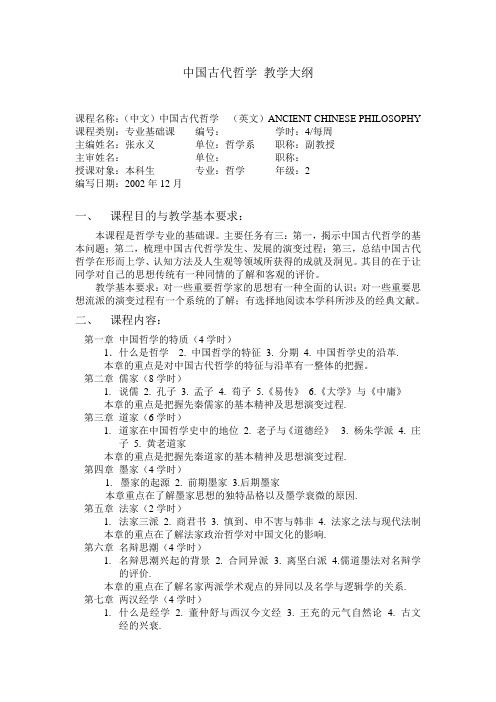
中国古代哲学教学大纲课程名称:(中文)中国古代哲学(英文)ANCIENT CHINESE PHILOSOPHY 课程类别:专业基础课编号:学时:4/每周主编姓名:张永义单位:哲学系职称:副教授主审姓名:单位:职称:授课对象:本科生专业:哲学年级:2编写日期:2002年12月一、课程目的与教学基本要求:本课程是哲学专业的基础课。
主要任务有三:第一,揭示中国古代哲学的基本问题;第二,梳理中国古代哲学发生、发展的演变过程;第三,总结中国古代哲学在形而上学、认知方法及人生观等领域所获得的成就及洞见。
其目的在于让同学对自己的思想传统有一种同情的了解和客观的评价。
教学基本要求:对一些重要哲学家的思想有一种全面的认识;对一些重要思想流派的演变过程有一个系统的了解;有选择地阅读本学科所涉及的经典文献。
二、课程内容:第一章中国哲学的特质(4学时)1.什么是哲学 2. 中国哲学的特征3. 分期4. 中国哲学史的沿革.本章的重点是对中国古代哲学的特征与沿革有一整体的把握。
第二章儒家(8学时)1.说儒2. 孔子3. 孟子4. 荀子5.《易传》6.《大学》与《中庸》本章的重点是把握先秦儒家的基本精神及思想演变过程.第三章道家(6学时)1.道家在中国哲学史中的地位2. 老子与《道德经》3. 杨朱学派4. 庄子 5. 黄老道家本章的重点是把握先秦道家的基本精神及思想演变过程.第四章墨家(4学时)1.墨家的起源2. 前期墨家3.后期墨家本章重点在了解墨家思想的独特品格以及墨学衰微的原因.第五章法家(2学时)1.法家三派2. 商君书3. 慎到、申不害与韩非4. 法家之法与现代法制本章的重点在了解法家政治哲学对中国文化的影响.第六章名辩思潮(4学时)1.名辩思潮兴起的背景2. 合同异派3. 离坚白派4.儒道墨法对名辩学的评价.本章的重点在了解名家两派学术观点的异同以及名学与逻辑学的关系.第七章两汉经学(4学时)1.什么是经学2. 董仲舒与西汉今文经3. 王充的元气自然论4. 古文经的兴衰.本章重点在了解汉代学术思想变迁的大势、两汉宇宙论对中国传统思维方式的影响.第八章魏晋玄学(6学时)1.玄学兴起的背景 2. 王弼的贵无论3. 阮籍与嵇康4. 郭象的独化论.本章的重点是了解玄学的性质、玄学独特的思想方法以及玄学的发展过程。
- 1、下载文档前请自行甄别文档内容的完整性,平台不提供额外的编辑、内容补充、找答案等附加服务。
- 2、"仅部分预览"的文档,不可在线预览部分如存在完整性等问题,可反馈申请退款(可完整预览的文档不适用该条件!)。
- 3、如文档侵犯您的权益,请联系客服反馈,我们会尽快为您处理(人工客服工作时间:9:00-18:30)。
Daoism
Daoist philosophy teaches that although all things exist in a state of transformation, they also possess an underlying order. This constantly changing, self-balancing order is known as the Dao, or the Way.
仁 义 礼 智 信
Portrait of Confucius (551-479 BC)
Benevolence, to be humanity, mercy and kindness;
Justness, to be righteousness ;
Rituals, custom and law, to be polite;
At 29 he rejected his luxurious life to seek enlightenment and the source of suffering. Lived a strict,ascetic[ə'setɪk](禁欲的) life for 6 years.
Who was the Buddha?
●Rejecting the extremes of luxury and asceticism禁欲, he sat in meditation沉思,
and found nirvana涅槃.[nɪə'vɑːnə]
●Became “The Enlightened One” at 35.
●Spent the remaining 45 years of his life teaching others how to achieve the peace of mind he had achieved
Buddhism was originally a branch of Hinduism( 印度教).
The “middle way of wisdom and compassion.”(essence)
2,500 year old tradition that began in India and spread and diversified [daɪ'vɜːsɪfaɪd]
Confucius 孔夫子 [kən'fju:ʃjəs]
As a teacher, Confucius taught altogether 3,000 students.
“the person who learns but
does not think is lost. the person who thinks but does not
Wisdom, to be knowledgeable and well educated;
royalty, faithful,reliable, accountable, responsible, creditable.
Ren(仁): Confucius defines it as “Airen”(爱人),that is , to love
2. The cause of suffering is self-centered desire
and attachments.
Four Noble Truths
3. The solution is to eliminate desire and attachments , thus achieving Nirvana .
Four Noble Truths
4. To reach nirvana, one must follow the Eightfold Path(八正道).
Eightfold Path
Nirvana涅槃
Zen Buddhism(禅宗佛教)
The “Meditation冥想 School.”
Seeks sudden enlightenment through meditation, arriving at emptiness
Who was the Buddha?
He died at the age of 80, after assembling a group of men and women disciples who continued to spread his teaching by word of mouth.
learn is in great danger”
——Confucius (学而不思则罔,思而不学则殆)
The landmark(标志性) of Confucianism is the Analects['ænəlekts](文选), which was written by his disciples(门 徒) after his death.
Topic: Ancient Chinese Philosophy 中国古代哲学
Name : Student number:
Chinese Philosophy
[kənˈfjuːʃənɪzəm]
—— Confucianism、 Daoism and Buddhism
Chinese tradition, culture, religion and historical development are greatly influenced by the philosophy of Confucianism, Daoism, and Buddhism,three great indigenous philosophical traditions of China.
Beauty, art, and aesthetics:
Gardens. Archery箭术 . Tea ceremony. Calligraphy.
Spread in China
Buddhism was spread to China during the Han Dynasty.
Stone carving of Laozi, Spring and Autumn Period (770-476 BC)
Dao is the essence(本质) and ultimate end of all things ,and
it is the process of reality itself, the way things come together while they
Confucianism
Confucianism emerged between the 6th through 5th century BC. Its founder, Confucius, expanded upon ancient Chinese concepts of humanism. He emphasized the value of the individual, the cultivation of personal ethics, and the importance of moral character. The concepts of benevolence (善行、仁) was the centre of Confucianism, and became the foundation of mainstream(主 流) Chinese culture.
What did the Buddha teach?
1. There is suffering in the world. To live is to
sufTfehre. Buddha found this out when he was
young and experienced suffering and death in others.
are still transforming . Dao is a kind of constant, universal principle
that underlies all phenomenon.
De
virtue or quality, and it is the whole of the spontaneity(
live is call De”
Wuwei
“non-doing” does not mean “doing nothing”, but means “to do or act naturally”.
Daoism has been influential in all aspects of Chinese culture, for example Chinese astrology(占星术), fengshui culture, some martial arts and styles of qigong, traditional medicine, even cuisine [kwɪ'ziːn] (烹饪)are closely related with Daoism.
It has been develeped with influence of Confucianism and Daoism
Influence on Chinese Culture
It had given a deep and tremendous influence to the Chinese philosophy、 literature、 the classic Chinese art 、 astronomy and medicine.
throughout the Far East
A philosophy, religion, and spiritual practice followed by more than 300 million people
